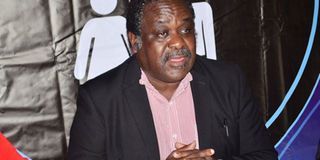Tacaids, Unicef keen on youth awareness of HIV/Aids, STDs

What you need to know:
The Tanzania Commission for AIDS (TACAIDS) in collaboration with the United Nations Children's Fund (UNICEF) has come up with ONGEA programme, which is intended to provide education to the youth that will enable them make apt decisions, which will prevent them from HIV/AIDS and Sexually Transmitted Diseases (STDs) infections.
Mbeya. The Tanzania Commission for AIDS (Tacaids) in collaboration with the United Nations Children's Fund (Unicef) is poised to launch a programme called ONGEA on Tuesday, May 7, 2019.
The program to be launched in Mbeya is intended to provide the youth with education through radio on means of preventing themselves from contracting HIV/AIDS and STDs infections.
Addressing a press conference on Monday, May 06, 2019, the Tacaids director general, Dr Leonard Maboko, said studies suggests that radio programmes played significant role in increasing youth awareness on HIV/AIDS and STDs.
“The programme will focus on youth issues including puberty and challenges facing them,” he said.
He said the programme will be implemented in four regions including Mbeya, Iringa, Njombe and Songwe and that eight district councils of Rungwe, Mbarali, Ileje, Mbozi, Makete, Njombe, Mufindi and Iringa have been selected.
According to him, the Tanzania HIV/AIDs Indicative Survey 2016/17, 72,000 people aged above 15 years were recorded to get new infections, noting that those ranging between 15 to 24 years accounted for 40 per cent of the total infections.
The Unicef programme officer at the department of AIDS and children, Ms Alice Fyomba, said the programme intended to reach at least 300,000 people, which is equivalent to 60 per cent of targeted youth aged between 15 and 19 years in eight district councils.
“There will be a group of 500 youth in each district council who will be interacting with peers in streets and initiate discussions on the topic and later provide us with feedbacks,” she said.
A resident of Mbeya, Mr Lusubisyo Mwakalinga, said the programme will benefit majority of the youth, noting that majority of them have been perishing due to failure of making imperative decisions on HIV/AIDS and STDs.



